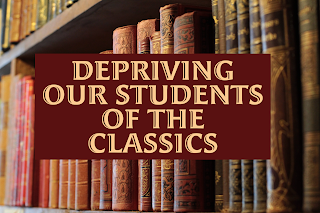If you don't know who Sarah MacKenzie is in the homeschool realm, she is the author of the blog and host of the podcast, Read Aloud Revival. She also is the author of the book, Homeschooling From Rest. She recently posted a class, which normally would be a part of her premium membership. I have listened to Sarah's podcast for a couple of years now, and she is fun and excited and knowledgeable. She interviews incredible children's authors, homeschooling leaders, curriculum writers, and more.
I went the very next day and bought the journals to use as reading journals, both for me and my youngest daughter. I set them up, and my daughter and I are off and running!
What are Reading Journals?
Reading journals are an amazing idea that, as a bookworm, I should have thought of earlier. I wish someone had told me about the idea years ago. Basically, the front of the book is list of books you have read. You can put the author, the pages in the book, or whatever description you want. I keep a running list every year of the books my children read in their planners. For my personal reading, I began keeping a list on Pinterest last year.
However, a reading journal is more than simply a list of books read. What makes the reading journal so special is that, after a few pages for the book list, you create a common place area. The rest of the journal is full of whatever you desire to help you interact with the book and make it yours. I am following Sarah's lead and putting in quotes from the books I am reading that touch me in some way. However, I could see an artistic person adding in artwork. I could see even adding in personal thoughts or Scripture. I might do some of that eventually, as I get used to interacting with my books. After all, reading books can be a bit like a conversation with the characters or the author. There can be some deep thinking about concepts.
I am curious how my ten year old will interact with her reading journal as time goes by. She loves writing and drawing and creating.
What is best is that, in years to come, these journals are wonderful keepsakes. Almost like a diary, they tell about the history of a person, the thoughts in their minds, the things that touched their hearts, the reading material that formed who they were. I wish I had reading journals from when I was a child. Other than a diary, there isn't a better way to look back and see what was influencing me at a certain age.
Books are holders of knowledge. They are reflections of our hearts. They are the stories that shape us. Engaging with a book on a personal level means that the story becomes more than just a story, it becomes a part of you. Concepts and lessons are taught very easily through story. I believe this is why Jesus used parables to teach lessons and engage His disciples. Stories impact the world unlike any other method of teaching.
We are just beginning our reading journals. I am entrenched in a couple of novels at this time, and find myself reading a little differently. I am looking for passages that touch me. I am still enjoying the story, or taking in the information. Now, when a passage catches my attention, I don't just share a quote on Facebook or underline (highlight in my Kindle) the words, I copy them into my reading journal. I find the passages in the children's stories I read to my daughter, and in the enchanting Baxter Family brought to life by Karen Kingsbury. It's like receiving messages from the authors or characters. The thoughts and words and lessons are stored, an interaction has occurred, and a piece of the book becomes a piece of me.
Sarah suggests not making the journals into "school." I agree. I don't want to damage the heart of reading, the joy that my daughter gets from reading by making it an assignment. I want to add to her love of reading, not detract from it. And so, the stories that make us who we are are engaged in with these reading journals in a special, individual way. It's beautiful and holds a depth that cannot be compared to "school." Books are about so much more than the academic lessons we call "school."








No comments:
Post a Comment